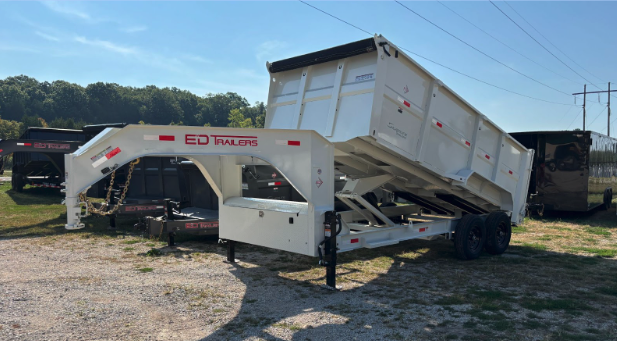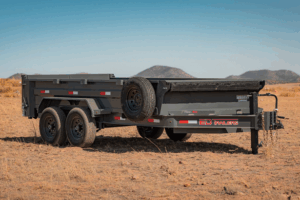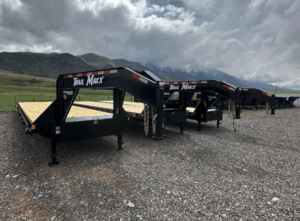Navigating the world of trailers can feel a little overwhelming. There are so many different designs and specializations, and choosing the right trailer for your specific needs is a big first step. Whether you need a simple solution for a quick job or a purpose-built trailer for consistent use, understanding the common types is the key to making a smart decision. The versatility of a trailer is defined by its design, what materials it’s made out of, and its axles, which determine the kinds of jobs it can handle.
This guide is designed to help you explore the types of trailers available today. We will break down the fundamental differences between the various models, from a simple utility trailer to a more specialized heavy-duty option. At SilverLine Trailers, our expertise lies in matching you with the perfect trailer for any task.

Common Trailer Types for Everyday Use
When you think about a trailer, you are probably picturing one of the most common types. These are the trailers that are perfect for a wide variety of jobs, from home projects to small businesses. They are known for their versatility and a bumper pull hitch that makes them easy to tow with most trucks.
Utility Trailers
A utility trailer is arguably the most recognizable and widely used trailer on the road. Its open design and flat trailer bed are perfect for hauling just about anything that needs to be moved. It’s a great choice for landscaping work, transporting furniture, or taking ATVs out for a weekend adventure.
Utility trailers come in various sizes and with different axles, which determine their towing capacity. A single-axle trailer is ideal for lighter loads and is easy to maneuver, while a tandem-axle setup provides more stability and a higher weight capacity.
Car Haulers
A car hauler is a specialized type of flatbed trailer that is designed specifically to transport vehicles. These trailers have a long, flat deck and come equipped with ramps that allow for easy loading and unloading.
A good car hauler will have a low deck height and a dovetail design, which is a sloped rear section that creates a shallow loading angle. This makes it much easier to drive a vehicle onto the trailer bed without causing any damage.
Understanding Enclosed Trailers
If you have cargo that needs to be protected from the weather or from theft, an enclosed trailer is the perfect solution. These trailers are essentially a moving box on wheels. They are also referred to as cargo trailers, and they offer a level of trailer security that an open trailer can’t match.
Enclosed vs. Flatbed Trailers
A key difference between an enclosed trailer and a flatbed trailer is the level of protection they provide. While a flatbed trailer is great for easy loading and heavy equipment, an enclosed trailer gives you four walls and a roof to protect your valuable items. This makes them ideal for moving furniture and appliances, storing tools, or hauling sensitive equipment.
Durability and Materials
The durability of an enclosed trailer depends a lot on its construction materials. They can be made from a variety of materials, including aluminum, which is lighter and more resistant to rust, or steel, which is stronger and more heavy-duty.
They also come in various sizes and can be customized to fit your specific needs. Some of the more specialized types of trailers in this category include livestock trailers which are used for safely transporting animals.
Heavy-Duty and Specialized Trailers
For some jobs, a standard utility trailer or car trailer just won’t cut it. When you need to haul heavier loads or large equipment, a more heavy-duty and specialized trailer is the only way to go. These types of trailers are built with specific jobs in mind and offer a higher level of durability and strength.
Gooseneck Trailer
A gooseneck trailer is a fantastic trailer option for anyone with a pickup truck who needs to haul serious weight. Unlike a standard bumper pull trailer that connects to the back of your vehicle, a gooseneck trailer attaches to a hitch in the trailer bed. This provides a more stable and secure connection, which is essential for transporting heavy equipment or other heavy loads over long distances.
Dump Trailers
A dump trailer is a workhorse on any job site. It’s an ideal solution for landscaping projects or construction jobs where you need to move bulk materials. These trailers have a hydraulic lift system that lets you unload your cargo with the push of a button, which is a massive time saver. A dump trailer is perfect for hauling things like gravel, dirt, debris, or construction materials.
Specialized Low-Deck Trailers
For items that are tall or especially heavy, a specialized low-deck trailer is necessary. These trailers are designed to get the cargo as low to the ground as possible.
- Lowboy Trailers: A lowboy trailer has a very low deck height, which makes it perfect for hauling heavy machinery like a forklift, bulldozers, or excavators that would be too tall for a standard flatbed trailer.
- Step Deck Trailers: A step deck trailer has an upper deck and a lower deck. This design gives you the versatility of a flatbed with the added benefit of a lower deck height for taller cargo.
- RGN Trailers: An RGN trailer, which stands for Removable Gooseneck Trailer, has a front that detaches and lowers to the ground to create a ramp. This makes it incredibly easy to load large equipment and heavy machinery that can be driven on and off the trailer bed. A double drop trailer is a variation of this design that creates an even lower deck height.
FAQs About Different Types of Trailers
Choosing the right trailer can be a complex decision, and it’s natural to have a lot of questions. Here are answers to some of the most common questions about the different types of trailers on the market.
What are the types of trailers in the supply chain?
The logistics and supply chain industries rely on a variety of trailer types to move goods. Some of the most common types include dry van trailers, which are the most widely used for general cargo. A flatbed trailer is a staple for moving oversized items and building materials.
For items that require temperature control, a reefer or refrigerated trailer is essential. Specialized trailers like a lowboy trailer or RGN trailer are used for transporting heavy equipment and large equipment that other trailers cannot accommodate.
What should I look for in a utility trailer?
When you’re choosing a utility trailer, you should first consider what you plan to haul. Then, you should look for a trailer with the appropriate payload capacity and axles to handle your needs. A single-axle trailer is ideal for lighter loads, while a tandem-axle trailer, also called a two axle trailer, provides more stability and a higher weight rating. You should also check the construction materials, such as steel or aluminum, and the quality of the welds and frame for long-term durability.
What can you use a gooseneck trailer for?
A gooseneck trailer is a great trailer option for anyone who needs to haul heavier loads with a pickup truck. Its hitch connects to the trailer bed, which provides superior stability and a much higher towing capacity than a bumper pull trailer. This makes it a great choice for transporting livestock trailers, construction materials, or even a horse trailer. A gooseneck is also easier to maneuver in tight spaces, which is a major advantage for commercial use or on a farm.
What is a Conestoga trailer?
A Conestoga trailer is a specialized trailer that looks like a flatbed trailer, but it has a unique retractable tarp system. This rolling tarp protects the cargo from the elements and road debris while still allowing for easy loading and unloading from the sides or the top with a forklift. It offers the protection of a cargo trailer with the versatility of a flatbed trailer.
How do different types of trailers impact towing capacity?
The type of trailer you use has a significant impact on your towing vehicle’s capacity. For example, a lightweight utility trailer is easy to tow and has a low towing capacity. However, a heavy-duty trailer like a lowboy trailer or a dump trailer requires a more capable towing vehicle and has a much higher weight rating.
The hitch also makes a difference. A gooseneck trailer has a higher towing capacity than a bumper pull trailer because its weight is distributed more evenly over the rear axles of the pickup truck.
Find the Right Trailer at SilverLine
At SilverLine Trailers, we are dedicated to helping you find the perfect trailer option for your needs. We offer a wide variety of new and pre-owned trailers in various sizes, from a simple utility trailer to a commercial dump trailer and everything in between. Come and visit one of our many locations or explore our website to find the right trailer for your next job. Contact us today to learn about our guaranteed financing and ask any questions you may have.




